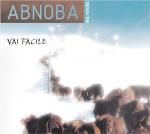

ABNOBA’s recording debut has all the signs of becoming an important addition to the Italian world music scene. Vai facile takes hold from the first listen, and has the qualities to enchant both folk music afficionados and those in search of more modern sonorities. But far from being a mere hybrid mishmash of styles, ABNOBA’s music is perfectly balanced, forging a wide variety of sounds into solidly constructed original pieces that are unashamed of their folk roots (in Northern Italy and elsewhere) while having their sights clearly set on the future. As the band’s members says “ABNOBA’s music is the fruit of artistic research whose aim isn’t so much to rediscover or reappropriate a particular folk repertoire as to provide the raw materials for composition and improvisation, creating a real evolution in folk music.” On Vai facile, these three foundation stones of tradition, compostion and improvisation come into perfect alignment. Hours of amusement can be had tracing the myriad different shadings and musical fragments that are brought together to form a music of great stylistic cohesion. One of the band’s intentions is in fact to interweave musical cultures from past and present, to come up with melodies inspired by the Italian and French traditions and fuse them with influences ranging from jazz and Balcan music, to classical harmony and funk. It was in the summer of 2004 that Vincent Boniface (clarinet, bagpipes, flutes), Simone Bottasso (melodeons), Paolo Dall’Ara (bagpipes, flutes, tarota), Pietro Numico (piano), Marco “Mammo” Inaudi (bass guitar) and Giovanni “Zap” Delfino (percussion) had the idea to form ABNOBA. These young musicians, all from Northern Italy, who had previously been involved in projects and collaborations both in Italy and abroad decided they wanted to follow in the footsteps of groups like Harmoniraptus, Stygiens and the Suriscot Trio. Harnessing their experience and knoweldge they started from their own ethnic background using classical folk instruments but modifying and adapting them and using new techniques to extend their possibilities. ABNOBA’s aim is partly “to try to create an Italian avant-folk whose sounds and ideas will attract a wider audience not necessarily au fait with the history of the instruments used.”


Vincent Boniface - clarinet, bagpipes, flutes
Simone Bottasso - melodeons
Paolo Dall'Ara - bagpipes, flutes, tarot
Pietro Numico - piano
Marco (Mammo) Inaudi - bass
Giovanni (Zap) Delfino - percussion
guests
Patrick Bouffard - hurdy-gurdy
Sabrina Pallini - voice
Silvia Carbotti - voice
Sebastien Tron - electric hurdy-gurdy

Our Playlist
Our olaylist on Spotify, dedicated to P
re Minimalism, Minimalism and Post Minimalism.
© 2025 Felmay Srl - P.I. 06974300011 | Powered by: Riccardo Marino

























